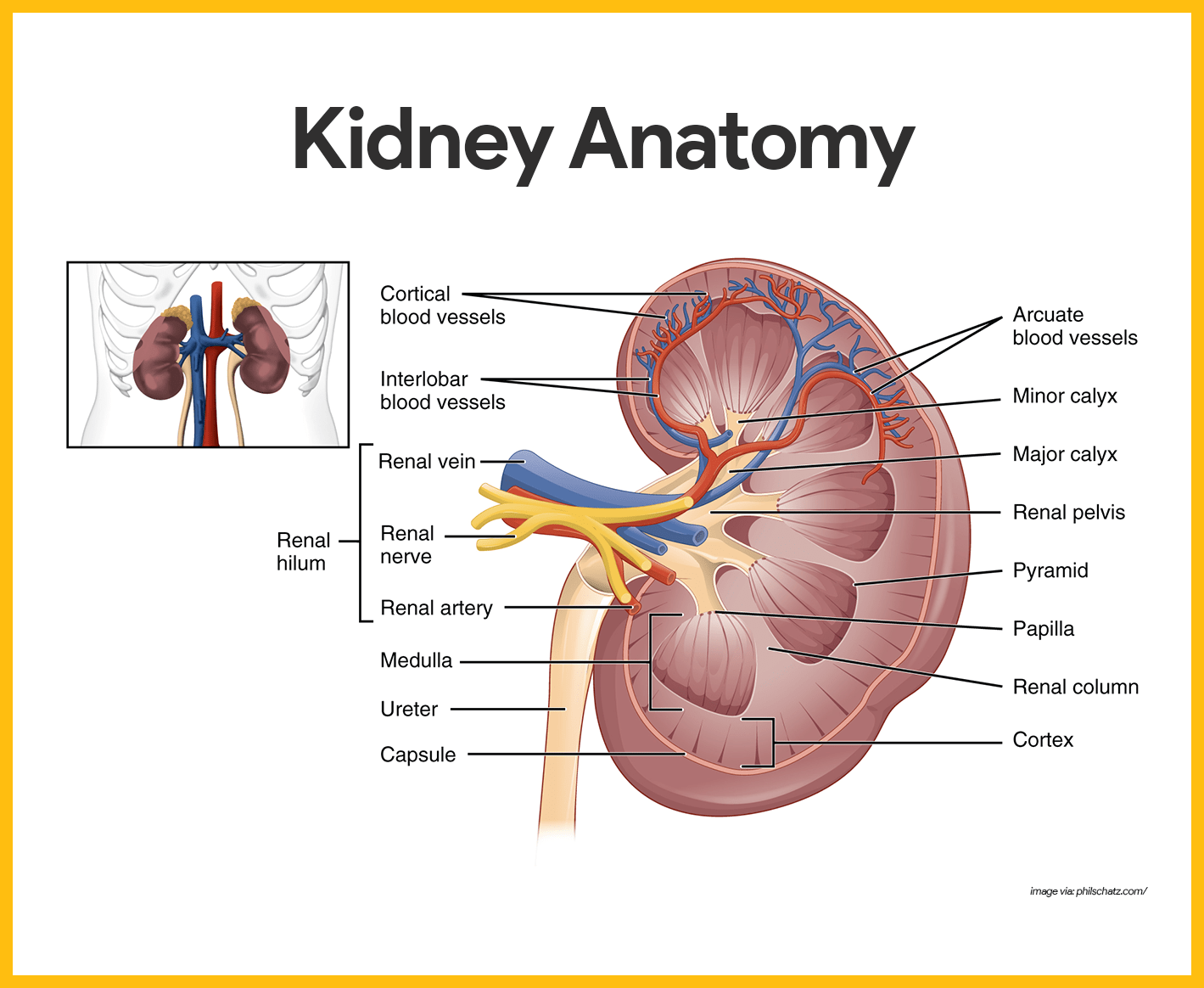Describe the Basic Physiological Functions of the Kidneys
The major known hormonal functions of the kidney influence blood pressure calcium metabolism and red blood cell production. Each kidney weighs between 120 grams about a quarter-pound to 170 grams 04 lbs.

Gross Anatomy Of The Kidney Anatomy And Physiology
The Kidneys are a two bean shaped organ located in the abdomen on each side of spine.

. These numbers vary based on a persons size and abnormal-sized kidneys could be a sign of kidney disease. The kidneys regulate the excretion of many substances at a rate that balances their input thereby maintaining appropriate body content of those substances. The kidney regulates plasma osmolarity by modulating the amount of water solutes and electrolytes in the blood.
The main purpose of the kidneys is to filter blood and maintain fluid and electrolyte balance in the body. About 380 gallons 1440 liters of blood flow through the kidneys every day. Homeostasis is the state where all functions of the body are stable and balanced.
Maintaining homeostasis involves controlling of fluid pH electrolyte balance blood pressure excretion of metabolic end products and foreign products enzyme and hormone production. Almost all solutes except for proteins are filtered out into the glomerulus by a process called glomerular filtration. It also stimulates erythrocyte production by producing the erythropoietin.
Establishes an osmotic gradient in the renal medulla and is important in the kidneys ability to produce urine of varying concentration Define Distal tubule and collecting ducts Variable controlled reabsorption of Na and H2O and secretion of K and H occur here. Each kidney removes waste materials and other chemicals which are not required by the body. Second the filtrate is.
The third function is secretion. Electrolytes and solutes like sodium and potassium are regulated in the kidneys and transported to different parts of the body. Kidney functions help remove waste and extra fluid from the body which allows for homeostasis.
Regulate the concentrations of numerous ions in blood plasma. It is about 4 or 5 inches long that is each about the size of. This takes the water removed from the blood during the filtration process and transports that clean water back into the blood.
The main function of the kidney is to eliminate excess bodily fluid salts and byproducts of metabolism this makes kidneys key in the regulation of acid-base balance blood pressure and many other homeostatic parameters. Normal physiology of Kidney includes filtration and excertion of the various substances from the blood that will ultimately be eliminated from the body. The kidneys role is to eliminate waste regulate fluid balance to avoid dehydration and over-hydration maintain the chemical composition and stability of blood regulate blood pressure and provide endocrine function to support bone and red blood cell formation.
Clear the blood plasma of unwanted substances there is filtration of substances from the blood into the kidney then reabsorption of important substances back into the blood unwanted substances remain in the kidney to eventually be eliminated from the body. If the kidney fails the internal environment of the body changes drastically that the cells will no longer function. Tubular secretion happens when material goes to the renal tubular lumen from the peritubular capillaries.
Kidneys filter blood in a three-step process. Most important functions of the kidney are described below. Purification of blood by removal of waste products is the most important.
Fluid leaving the collecting duct is urine which enters the renal pelvis. The kidneys are composed mainly of tubules and closely associated blood vessels. The kidneys produce erythropoietin a hormone that stimulates your bone marrow to produce more red blood cells when the bodydoes not get enough oxygen.
They normally range in size from 8 to 14 centimeters or 3 to 55 inches. Regulates red blood cells. A major function of the kidneys is to regulate the volume and osmolality of extracellular fluid volume.
Describe the basic physiological functions of the kidneys. The kidneys help maintain proper acid-base balance to keep the body healthy. First the nephrons filter blood that runs through the capillary network in the glomerulus.
The second fundamental function of the kidneys is re-absorption. Acids are products of metabolism. The kidney eliminates a variety of metabolic products urea uric acid and creatinine and conserves and excretes water and electrolytes.
Removal of waste products. The primary function of the kidney is to make urine and purify the blood. Regulate electrolyte salt concentrations Regulate amount of fluid within the body Help regulate blood pressure Help maintain acid-base balance Produce hormones that affect blood and bones.
Filtration reabsorption and secretion keep the organism in balance in terms of water minerals electrolytes and hydrogen ion concentration and eliminate the toxic substances produced by the body. Together your kidneys filter your bodys entire blood volume about 300 times per day. Regulate osmotic pressure of the body fluids by excreting osmotically dilute or concentrated urine 2.
When studying the anatomy of the kidney it is helpful to keep in mind the functions of the kidney. What are the functions of the kidney. Regulation of the quantity of blood electrolytes the water-soluble atoms carrying an electrical charge such a sodium Na and potassium K and phosphate HPO42- Long term maintenance of blood pH H Safeguarding of plasma osmolality and thereby blood and.
Functions of the Kidney 1. Removal of water-soluble metabolic waste products from blood. It ensures long term acid-base balance and also produces erythropoietin which stimulates the production of red blood cell.

The Anatomy Of The Urinary System Quiz 1 Basic Anatomy And Physiology Anatomy And Physiology Test Anatomy

Kidney Function And Physiology Biology For Majors Ii

Kidney Anatomy Nephron Filtration Diagram Photo Kidney Anatomy Basic Anatomy And Physiology Anatomy

Urinary System Anatomy And Physiology Study Guide For Nurses
0 Response to "Describe the Basic Physiological Functions of the Kidneys"
Post a Comment